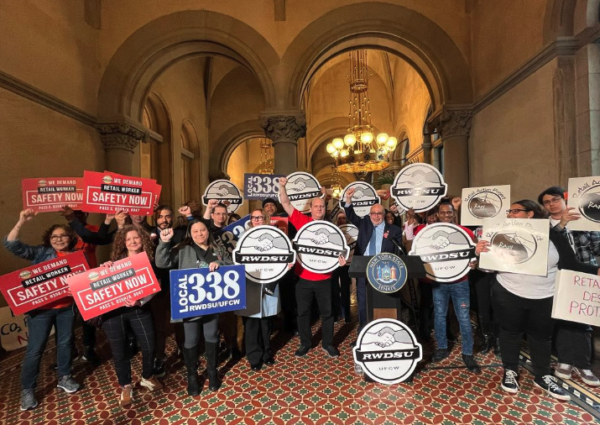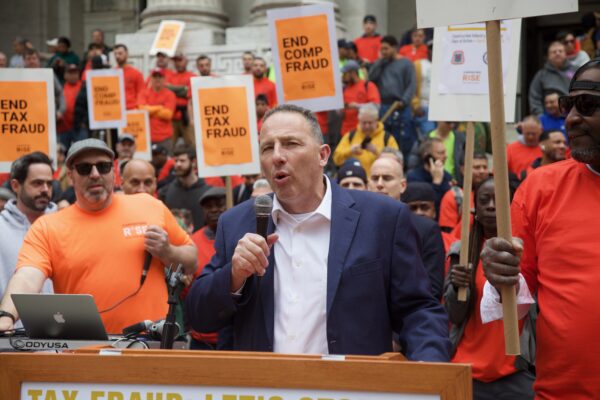September 18, 2013
By Joe Maniscalco

New York, NY – Winning Democratic primary candidates who largely owe their recent victories to public campaign financing are so convinced of the system’s inherent merits, that they are now pushing hard to have the process implemented statewide.
“With the Moreland Commission on Public Corruption due to hold their first hearings, it is only appropriate that we gather here today some of the people who know first hand about running in an environment polluted by big money to talk about their winning solution for overcoming it,” Citizen Action of New York’s Jesse Laymon said on Monday.
Five Democratic city council candidates – incumbents and fresh faces alike – joined with Citizen Action of New York, as well as Common Cause and the Working Families Party, on the steps of City Hall to push the Moreland Commission to do something about the ability of deep-pocketed super PACs – like the real estate industry-backed Jobs For New York – to overpower the clout of individual voters.
According to Susan Lerner of Common Cause, Jobs For New York spent $5 million in the last primary in an effort to influence 22 city council races across the city. However, despite the deluge of cash, they were not entirely successful.
In Brooklyn’s 39th Council District, Carlos Menchaca used public matching financing to defeat incumbent Sara Gonzalez – and is now poised to become the first Mexican-American ever to be elected to the New York City Council.
Jobs For New York reportedly spent $300,000 on the Menchaca/Gonzalez race, and about $52,000 on incendiary ads pointed directly at Menchaca himself, which the primary winner calls “gross.”
“They were anti-immigrant, racist, xenophobic ads,” Menchaca said. “This is why the Moreland Commission needs to do an investigation on how this happened and how we can prevent it the next race.”
The Governor Cuomo-convened Moreland Commission is slated to hold its first hearings this week. Their first detailed report is due in December.
“We are proof that we don’t need big money to win, and if candidates have people power on their side, they can’t be bought,” incumbent City Councilmember Margaret Chin said. “Independent expenditures undermine the democratic process. If you want to end the legalized bribery that rules Albany’s politics, the solution is right here in New York City. The campaign public financing fund works here and it can work in New York State.”
Interestingly, even though Councilmember Chin is a founding member of the Progressive Caucus, the legislator said that still didn’t stop the Jobs For New York super PAC from donating heavily to her campaign in an effort to gain her sympathies. Councilmember Chin believes broadening the public campaign financing system makes sense, and is the remedy for such “pay to play” politics.
“Jobs for New York put money into my race without me asking for it, and without my control,” Councilmember Chin said. “If they thought they could control me, they failed.”
At the very least, newcomer Laurie Cumbo from Brooklyn’s 35th District, said that candidates should be able to control their own campaigns without the influence of big money.
“Those that have the most money, power and influence should not be allowed to take over the political system and undermine democracy,” Cumbo said. “If we allow special interests groups and big outside spending corporate money override public campaign financing, we will no longer have a democracy.”
Mark Levine is another primary winner with progressive credentials who nevertheless found himself the unwanted recipient of the super PAC’s largess. The Democratic contender for Manhattan’s 7th Council District said that the current system ushered in the wake of the post-Citizens United era, threatens to make candidates “secondary players” in their own campaigns.
“As bad as the situation is, it would have been much worse without the city’s campaign financing system,” Levine said.
New York City Council candidate Ben Kallos said that the kinds of $10 donations that he managed to ride to victory in Manhattan’s 5th Council District primary last week, allows “idealists” and “reformers” to be successful without becoming indebted to big money.
“Public campaign financing works,” Kallos said.
Some, however, fear that the effort to quell big money PACs like Jobs For New York could at the same time also stifle contributions from organized labor.
Lerner rebuffed the notion.
“The wonderful thing about a fair election system is that it is politically neutral,” Lerner said. “It’s money that comes from the voters to any candidate who qualifies – left, right or center. Here in New York City, we have Democrats and Republicans that have run effective campaigns with the matching funds system. So, while we’ve heard from a number of progressive candidates today, it’s not exclusively a progressive idea – it’s a pro-voter idea.”
New York City has had a public campaign financing system since 1988. According to Levine, that puts the state “literally a generation behind.”
“The state system is the wild west and we have to change that,” Levine said.



